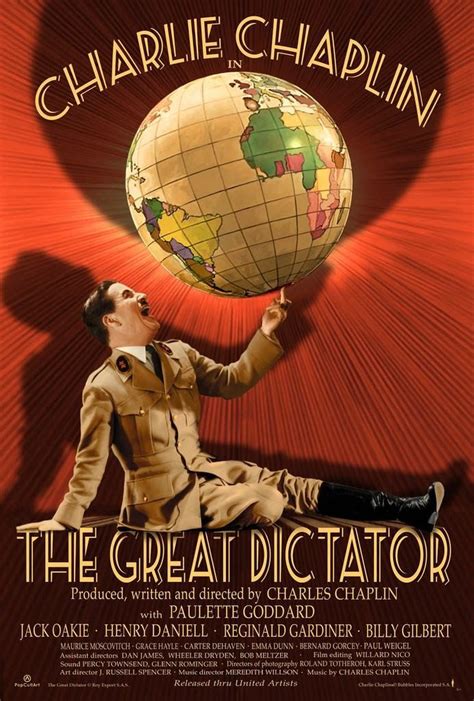The Great Dictator
directed by: Charlie Chaplin, year: 1940
actors: Charlie Chaplin, Paulette Goddard, Jack Oakie, Reginald Gardiner
actors: Charlie Chaplin, Paulette Goddard, Jack Oakie, Reginald Gardiner

Description:
The Great Dictator is a satirical comedy-drama that delivers a poignant social critique of totalitarian regimes, particularly Nazi Germany. Directed by and starring Charlie Chaplin, the film uses humor and satire to convey its message against dictatorship and anti-Semitism. Through the parallel stories of a Jewish barber and the tyrannical ruler Adenoid Hynkel, Chaplin highlights the absurdity and cruelty of authoritarian power.Keywords:
Comedy, Satire, Drama, War, Social CritiqueWhy was The Great Dictator banned?
"The Great Dictator," directed by Charlie Chaplin, faced bans in several countries upon its release in 1940 due to its satirical portrayal of Adolf Hitler and the Nazi regime. The film's critique of fascism and its bold political commentary were viewed as offensive or dangerous by authoritarian governments, particularly in Germany and Italy. Additionally, its anti-war message and Chaplin's depiction of a Jewish barber as a hero challenged the prevailing ideologies of the time, prompting censorship in various regions concerned about political repercussions.
Is The Great Dictator based on a true story?
"The Great Dictator," released in 1940, is not based on a true story but is a satirical comedy by Charlie Chaplin that parodies Adolf Hitler and the rise of fascism in Europe. The film features Chaplin in dual roles: a Jewish barber mistaken for the dictator of Tomainia. While it reflects the political climate of the time and critiques totalitarianism, it is a fictional narrative meant to deliver a poignant message about humanity, freedom, and the dangers of oppression.
Why did Charlie make the film called The Great Dictator?
Charlie Chaplin made "The Great Dictator" as a satire against Adolf Hitler and the rise of fascism in Europe during the 1930s. Released in 1940, the film was a bold political statement, using humor to critique totalitarian regimes and promote themes of democracy and human rights. Chaplin, who portrayed both a Jewish barber and a dictator, aimed to inspire hope and encourage solidarity among oppressed people. The film's iconic final speech advocates for kindness and unity, emphasizing the importance of humanity over tyranny.
Why was The Dictator movie banned?
"The Great Dictator," directed by Charlie Chaplin and released in 1940, faced bans in several countries due to its satirical portrayal of Adolf Hitler and the Nazi regime. The film's critical stance on fascism and its bold humor were seen as provocative, leading to censorship in nations sympathetic to or aligned with Germany. Additionally, its anti-authoritarian message and depiction of dictatorship were controversial in places where government control was strong. Despite these bans, the film remains a significant work in cinema history for its social commentary and comedy.
Explore More Categories:
Multiverse Biographical Documentary Tense Atmosphere Life Reflection Siblinghood Teen Romance Meta Horror Biographical Crime Drama German Film Paranormal Forbidden Love Rural Workplace Discrimination Urban Landscape Alienation Feminism Renaissance Siege Slice Of Life Compassion Midlife Crisis Road Movie British Film Heroic Bloodshed Origin Story